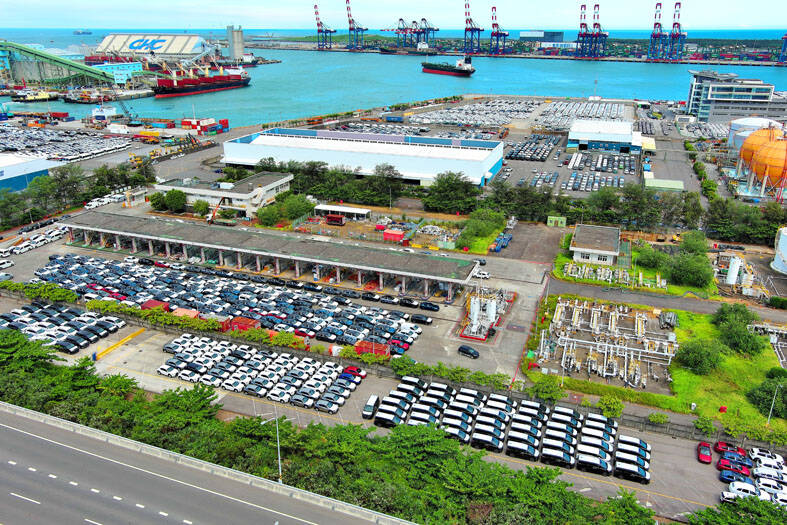Hotai Motor Co (和泰汽車), which distributes Toyota and Lexus vehicles in Taiwan, yesterday kept its sales target unchanged for this year, but withdrew the full-year forecast for Taiwan’s new car sales amid US tariff uncertainty.
The company said it was less affected by the tariff issue as its new vehicle sales this year have increased 4 percent year-on-year.
The company said that as it manages to buck the local car market’s downtrend, it is sticking to its new car sales target for this year of 165,000, compared with 159,000 units sold last year.

Photo: CNA
Hotai said its market share target remains at 36.7 percent, versus 34.9 percent last year.
New car sales in Taiwan tumbled 15.7 percent year-on-year in the first seven months of this year to 234,450 units, as consumers took a wait-and-see attitude, and expected tariff cuts on imported US cars and a lower commodity tax.
To stimulate the auto market, legislators last week approved a five-year extension to commodity rebates to the end of 2030. Consumers were eligible to pay up to NT$100,000 (US$3,270) less commodity tax per car when retiring old cars, but the rule has also become applicable to those who only buy new cars.
Hotai at the beginning of this year predicted that the domestic car market would record new vehicle sales of about 450,000 units this year, down 1.53 percent from 457,000 units last year. The company dropped its projection yesterday.
The company’s net profit tumbled 32.54 percent to NT$3.96 billion in the second quarter, from NT$5.87 billion in the same period last year. The company attributed the decline to lower asset disposal gains and fewer tax incentives.
On a quarterly basis, net profit declined 22 percent from NT$5.08 billion.
Earnings per share fell to NT$7.1 last quarter, from NT$10.54 a year earlier and NT$7.73 the prior quarter.
In the first half of this year, net profit totaled NT$8.26 billion, down 29.7 percent year-on-year, with earnings per share dropping from NT$21.1 to NT$14.83, Hotai said.

SETBACK: Apple’s India iPhone push has been disrupted after Foxconn recalled hundreds of Chinese engineers, amid Beijing’s attempts to curb tech transfers Apple Inc assembly partner Hon Hai Precision Industry Co (鴻海精密), also known internationally as Foxconn Technology Group (富士康科技集團), has recalled about 300 Chinese engineers from a factory in India, the latest setback for the iPhone maker’s push to rapidly expand in the country. The extraction of Chinese workers from the factory of Yuzhan Technology (India) Private Ltd, a Hon Hai component unit, in southern Tamil Nadu state, is the second such move in a few months. The company has started flying in Taiwanese engineers to replace staff leaving, people familiar with the matter said, asking not to be named, as the

The prices of gasoline and diesel at domestic fuel stations are to rise NT$0.1 and NT$0.4 per liter this week respectively, after international crude oil prices rose last week, CPC Corp, Taiwan (台灣中油) and Formosa Petrochemical Corp (台塑石化) announced yesterday. Effective today, gasoline prices at CPC and Formosa stations are to rise to NT$27.3, NT$28.8 and NT$30.8 per liter for 92, 95 and 98-octane unleaded gasoline respectively, the companies said in separate statements. The price of premium diesel is to rise to NT$26.2 per liter at CPC stations and NT$26 at Formosa pumps, they said. The announcements came after international crude oil prices

DOLLAR SIGNS: The central bank rejected claims that the NT dollar had appreciated 10 percentage points more than the yen or the won against the greenback The New Taiwan dollar yesterday fell for a sixth day to its weakest level in three months, driven by equity-related outflows and reactions to an economics official’s exchange rate remarks. The NT dollar slid NT$0.197, or 0.65 percent, to close at NT$30.505 per US dollar, central bank data showed. The local currency has depreciated 1.97 percent so far this month, ranking as the weakest performer among Asian currencies. Dealers attributed the retreat to foreign investors wiring capital gains and dividends abroad after taking profit in local shares. They also pointed to reports that Washington might consider taking equity stakes in chipmakers, including Taiwan Semiconductor

A German company is putting used electric vehicle batteries to new use by stacking them into fridge-size units that homes and businesses can use to store their excess solar and wind energy. This week, the company Voltfang — which means “catching volts” — opened its first industrial site in Aachen, Germany, near the Belgian and Dutch borders. With about 100 staff, Voltfang says it is the biggest facility of its kind in Europe in the budding sector of refurbishing lithium-ion batteries. Its CEO David Oudsandji hopes it would help Europe’s biggest economy ween itself off fossil fuels and increasingly rely on climate-friendly renewables. While